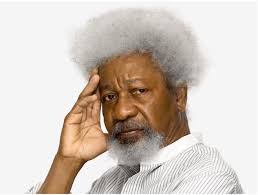Today marks the 90th birthday of Professor Emeritus Wole Soyinka — playwright, novelist, essayist, and academician. As the first person from Sub-Saharan Africa to win the Nobel Prize in Literature, he stands tall among men and women of letters who etched large footprints in the sands of time. His attaining the ripe age of 90 is, no doubt, a cause for celebration and keen introspection.
Little wonder, then, that many literary minds from Abuja to Lagos, and Port Harcourt to Rabat, Morocco, have organised events in his honour. Two of such events stood out: the one organised by the Royal Academy of Morocco, in collaboration with the Pan African Writers Association (PAWA), on July 11 in Rabat, which was attended by Soyinka in person, and the other was the naming, yesterday by President Bola Tinubu, of the National Theatre after Wole Soyinka. Born in Abeokuta, Ogun State, on July 13, 1934, Akinwande Oluwole Babatunde Soyinka is the second of the seven children of Samuel Ayodele Soyinka, an Anglican priest and headmaster of St.

Peter’s Primary School, Abeokuta, and Grace, a trader cum women activist. After finishing primary school, Soyinka went to Abeokuta Grammar School, and Government College, Ibadan (1946-1952). He studied for two years at University College, Ibadan (1952–54), after which he proceeded to Leeds University in the United Kingdom, where he obtained a Bachelor of Arts degree.
He began to write drama in his early years in the university, attracting positive responses in Leeds and in London where he moved upon graduation. His first major play, The Swamp Dwellers (1958) and the second, The Lion and the Jewel (1959), signified at once his potential as a notable African dramatist. His reputation was solidified following their performance in theatres and publication in London.
Buoyed by his success, he went on to write play after play, as well as other literary formats, until he achieved an enviable record as one of the leading writers on the globe. Soyinka has published 30 plays, four novels, six memoirs, eight poetry collections, three films, two translated novels, several short stories and essays, as well as various musical works. His popular literary works include (not in any logical order): Kongi’s Harvest, The Interpreters, The Man Died, The Trials of Brother Jero, A Dance of The Forest, Death and the King’s Horsemen, You Must Set Forth at Dawn, Before the Blackout, The Detainee, The Road, The Strong Breed, The Bacchae of Euripides, Poems from Prison, Season of Anomy, Aké: The Years of Childhood, Requiem for a Futurologist, Ìsarà: A Voyage Around Essay, Ibadan: The Penkelemes Years (A Memoir: 1946–1965) and the 2021 book, Chronicles from the Land of the Happiest People on Earth, his first novel in almost 50 years.
As a writer, he has a style uniquely his own, a master craftsman in his diction which many find obscurantist and cryptic. He was awarded the 1986 Nobel Prize in Literature for his “wide cultural perspective and..
. poetic overtones fashioning the drama of existence”. He is the recipient of many other distinguished prizes and accolades, including the Europe Theatre Prize in the “Special Prize” category, which is awarded to someone who has “contributed to the realisation of cultural events that promote understanding and the exchange of knowledge between peoples”.
In the academic lane, Soyinka has an enviable record as a scholar. He has taught at many renowned universities on three continents. He first taught at Obafemi Awolowo University (former University of Ife) where he was Professor of Comparative literature (1975–1999).
In the United States he taught at Cornell University, Emory University, University of Nevada, New York University, Loyola Marymount University, Harvard University, Yale University, and Duke University. In England, he taught at Cambridge and Oxford universities. He was also at the University of Johannesburg, South Africa, as a Distinguished Visiting Professor in the Faculty of Humanities.
Deservedly, Soyinka was given honorary degrees by universities around the world, the icing on the cake being his award of Professor Emeritus by Obafemi Awolowo University in 1999. Soyinka’s literary and academic careers went hand in hand with his role as a political activist. As with the other two, he started the fight early, both in school and in the wider world.
He is a fighter for social justice, an opponent of dictatorship, corruption and the personality cult system that has always defined our societies. Consequently, he is always at odds with the powers that be and earned the reputation of being controversial. He was first arrested in 1965 when he seized the Western Nigeria Broadcasting Service (WNBS) radio studio at gunpoint and replaced the Premier’s speech with his own tape in which he broadcast a demand for the cancellation of the Regional elections.
For this, he was detained for 22 months. Two years later, he was found cavorting with Colonel Emeka Ojukwu, leader of the rebel Biafra side in the Nigerian Civil War, claiming to be making an effort at mediation. For this adventure, he was accused of treason and arrested by the federal government and detained in solitary confinement for two years, during which he wrote his first memoir, The Man Died.
His criticism against the Abacha regime allegedly made the government decide on finishing him off. Tipped by insiders, he made a dramatic escape from Nigeria on a motorcycle across the Benin Republic border. Subsequently, the regime sentenced him to death “in absentia” for treason.
He remained in exile in the U.S. until civilian rule was restored to Nigeria.
Fearless and unflagged in his world view, he has continued to tug at our conscience as a nation, never deterred by threats to his life especially during the military regimes of Generals Yakubu Gowon and Abacha. Of course, he has shortcomings. Sometimes he harbours tribal and religious bigotry, and is inconsistent in his political leaning.
His recent call for a ban on Fulani herdsmen from grazing their cattle in southern Nigeria and that they should be declared terrorists to enable the restriction of their movement was nothing but sheer bigotry fed by the ethnicism with which he has been identified since Independence. He is also accused of inspiring the establishment of the much dreaded campus cults in Nigerian tertiary institutions of learning, having been one of the seven persons who in 1952 founded the National Association of Seadogs (Pyrates Confraternity), the first campus cult in the country ostensibly founded to fight corruption and injustice. His being a professed atheist in a religious society like ours is a personal choice which most Nigerians disagree with.
Nonetheless, he remains an icon whose influence on Nigerian and global cultures is pervasive. We at Blueprint are happy to note that Soyinka’s 90 years on earth so far have been not only eventful but also fruitful. His contribution to our literary landscape is rich with a huge corpus of works that cuts across various genres of literature.
Even though we are saddened to note that he has been battling prostate cancer, which he announced in 2014, we salute him and wish him many more years of harvest. We take solace in the citation read in 2017, when he received the Special Prize of the Europe Theatre Prize, in Rome, which asserted: “Wole Soyinka has contributed to a renewal of African cultural life, participating actively in the dialogue between Africa and Europe, touching on more and more urgent political themes and bringing, in English, richness and beauty to literature, theatre and action in Europe and the four corners of the world.” We can’t agree more.
.



















